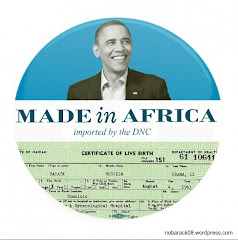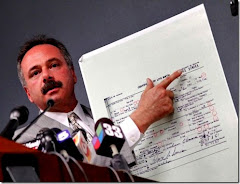Monday, July 12, 2010
New Orleans Judge Better Put Out His Resume
The Obama Regime with the count No Balls and Two Strikes, is making a third attempt at getting a 6 month moratorium ban on deep water drilling. The schmucks at the DOIn J just won't take no for an answer. I say it's time to slap a mega sanction on Eric Holder personally for wasting the Courts time, and for having the crappiest hair plug job in all of DC, next to Joe Bidden's, I mean what's on top there brillo pads. Those wirey plugs are obviously receiving radio signal static that's screwing with his T waves, how else can you explain the lack of understanding, No Means No.
The good judge should be looking around for another line of work, I feel a change ablowin in the wind. You know the Vindictive One has his fangs out.
Steve
++++++++++++++++++++++++++++
July 12, 2010
The Houston Chronicle
By Tom Fowler
UPDATED: Government to impose new drilling ban today
The Obama administration is set today to impose a new ban on deep-water drilling -- this time carefully rewritten in hopes of solving the problems that prompted a federal court to toss out the first attempt.
An administration official confirmed the new moratorium -- likely to come in the form of a "notice to lessees" -- will be issued later shortly. The new directive effectively replaces NTL No. 4, the May 30 order that imposed the moratorium first announced by President Barack Obama three days earlier.
The administration has lost three bids to preserve the ban in federal courts, where it has so far been successfully challenged by Hornbeck Offshore Services and oil services companies. On June 22, a federal district judge tossed out the moratorium, saying the administration had overreached with a "blanket" ban on all drilling in water depths of at least 500 feet.
Two days later, the same judge rejected the administration's request to reinstate the moratorium while the government appealed the ruling. And on July 8, a three-judge panel of the New Orleans-based 5th Circuit Court of Appeals agreed, also refusing to reinstate the ban in the meantime.
According to a summary of the new order obtained by Hearst Newspapers and the Houston Chronicle, Interior Secretary Ken Salazar's new ban -- technically a suspension of deep-water drilling activities -- would apply until Nov. 30, unless he decides to lift it earlier. The Interior Department is citing its authority under the Outer Continental Shelf Lands Act in imposing the four-month suspension.
In effect, the new suspension is largely a repeat of the May 30 order that halted drilling on 33 deep-water projects in the Gulf of Mexico -- even though it is written with new nuance and detail.
For instance, the new order appears to apply to all deep-water drilling -- despite recent signals from Salazar that he might be willing to allow some less-risky operations to resume while continuing to block more speculative projects. For instance, Salazar had told lawmakers he was considering allowing drilling to resume in well-known reservoirs (such as appraisal and development wells) while still blocking exploratory drilling in new fields where pressure readings and other data is unavailable. BP's doomed Macondo project was one such exploratory well.
According to the summary of the new order, Salazar "is open to modifying the new deep-water drilling suspensions based on new information, but industry must raise the bar on its practices and answer fundamental questions about deep-water safety, blowout prevention and containment, and oil spill response."
The administration has insisted a ban is needed to prevent a devastating repeat of the Deepwater Horizon disaster, because, the government says there is not enough available technology and resources to contain another oil spill. When Obama announced the first moratorium on May 27, he insisted it was necessary to take a timeout on drilling while the cause of the oil spill is investigated and the government imposes new safety rules on offshore exploration.
Gulf Coast officials and industry leaders have warned that a continued deep-water drilling ban could devastate the region's economy, which is already ailing as a result of the spill that has shuttered commercial fishing operations and harming tourism.
At least one drilling rig -- Diamond Offshore's Ocean Endeavor -- >is abandoning the Gulf of Mexico because of the deep-water drilling ban. The Endeavor, which had been leased by Devon Energy Corp., is now being sent to Egyptian waters; less than 40 of the roughly 110 workers onboard will remain with the rig.
Gulf Coast officials warn that for every offshore job, there are several onshore that are tied to the industry -- supplying rigs with everything from rope to food.
White House spokesman Robert Gibbs today insisted that the administration is not immune to those concerns.
"We know that that is not without some economic consequences to the region," Gibbs said, "but it's imperative that we have a sense of what happened before we continue to do this again."
Lawmakers were already weighing in on the ban -- based on the circulating summary and press reports -- before it was issued by the Interior Department.
Rep. Ed Markey, D-Mass., said the ban was necessary to "reduce oil spill risk," and emphasized that it would not curb ongoing production in the Gulf of Mexico. "As new laws and safety measures are put into place on these few dozen rigs, 97 percent of the manned rigs in the Gulf will still be allowed to work."
The suspension is needed, according to the Interior Department, to allow time for the implementation of new safety changes and for:
•operators to submit evidence that they have the ability to respond "effectively" to a potential oil spill in the Gulf of Mexico, given all of the resources -- such as dispersants, skimmers and boom -- that have been dedicated to the BP spill;
•authorities to assess the best ways to intervene and contain runaway wells and blowouts; and
•the analysis of evidence that could shine a light on the causes of the April 20 explosion of the Deepwater Horizon drilling rig, so that a similar disaster can be averted in the future.
The new moratorium order is expected to be issued with new justification -- responding to the federal district court's determination that the administration didn't do enough to support its first ban attempt.
In meetings with industry officials and on Capitol Hill, Salazar has been stressing that it will be months before the critical device known as the blowout preventer -- which failed to halt the gushing oil and gas at the Macondo well -- is removed from the site and investigated. Because blowout preventers are designed as fail-save devices and final guarantees against runaway wells -- in use at drilling sites across the Gulf of Mexico -- knowing what happened to the equipment at the BP site is essential, Salazar has argued.
The administration also is expected to make the case that the industry is ill-equipped to respond to a blowout in deep water -- as evidenced by the nearly three months that oil has been flowing into the Gulf of Mexico. In legal briefs, the administration also has stressed that essential resources to clean up and contain another spill -- from chemical dispersants to boom -- are tied up with the BP disaster, making them unavailable if another spill happened soon.
The good judge should be looking around for another line of work, I feel a change ablowin in the wind. You know the Vindictive One has his fangs out.
Steve
++++++++++++++++++++++++++++
July 12, 2010
The Houston Chronicle
By Tom Fowler
UPDATED: Government to impose new drilling ban today
The Obama administration is set today to impose a new ban on deep-water drilling -- this time carefully rewritten in hopes of solving the problems that prompted a federal court to toss out the first attempt.
An administration official confirmed the new moratorium -- likely to come in the form of a "notice to lessees" -- will be issued later shortly. The new directive effectively replaces NTL No. 4, the May 30 order that imposed the moratorium first announced by President Barack Obama three days earlier.
The administration has lost three bids to preserve the ban in federal courts, where it has so far been successfully challenged by Hornbeck Offshore Services and oil services companies. On June 22, a federal district judge tossed out the moratorium, saying the administration had overreached with a "blanket" ban on all drilling in water depths of at least 500 feet.
Two days later, the same judge rejected the administration's request to reinstate the moratorium while the government appealed the ruling. And on July 8, a three-judge panel of the New Orleans-based 5th Circuit Court of Appeals agreed, also refusing to reinstate the ban in the meantime.
According to a summary of the new order obtained by Hearst Newspapers and the Houston Chronicle, Interior Secretary Ken Salazar's new ban -- technically a suspension of deep-water drilling activities -- would apply until Nov. 30, unless he decides to lift it earlier. The Interior Department is citing its authority under the Outer Continental Shelf Lands Act in imposing the four-month suspension.
In effect, the new suspension is largely a repeat of the May 30 order that halted drilling on 33 deep-water projects in the Gulf of Mexico -- even though it is written with new nuance and detail.
For instance, the new order appears to apply to all deep-water drilling -- despite recent signals from Salazar that he might be willing to allow some less-risky operations to resume while continuing to block more speculative projects. For instance, Salazar had told lawmakers he was considering allowing drilling to resume in well-known reservoirs (such as appraisal and development wells) while still blocking exploratory drilling in new fields where pressure readings and other data is unavailable. BP's doomed Macondo project was one such exploratory well.
According to the summary of the new order, Salazar "is open to modifying the new deep-water drilling suspensions based on new information, but industry must raise the bar on its practices and answer fundamental questions about deep-water safety, blowout prevention and containment, and oil spill response."
The administration has insisted a ban is needed to prevent a devastating repeat of the Deepwater Horizon disaster, because, the government says there is not enough available technology and resources to contain another oil spill. When Obama announced the first moratorium on May 27, he insisted it was necessary to take a timeout on drilling while the cause of the oil spill is investigated and the government imposes new safety rules on offshore exploration.
Gulf Coast officials and industry leaders have warned that a continued deep-water drilling ban could devastate the region's economy, which is already ailing as a result of the spill that has shuttered commercial fishing operations and harming tourism.
At least one drilling rig -- Diamond Offshore's Ocean Endeavor -- >is abandoning the Gulf of Mexico because of the deep-water drilling ban. The Endeavor, which had been leased by Devon Energy Corp., is now being sent to Egyptian waters; less than 40 of the roughly 110 workers onboard will remain with the rig.
Gulf Coast officials warn that for every offshore job, there are several onshore that are tied to the industry -- supplying rigs with everything from rope to food.
White House spokesman Robert Gibbs today insisted that the administration is not immune to those concerns.
"We know that that is not without some economic consequences to the region," Gibbs said, "but it's imperative that we have a sense of what happened before we continue to do this again."
Lawmakers were already weighing in on the ban -- based on the circulating summary and press reports -- before it was issued by the Interior Department.
Rep. Ed Markey, D-Mass., said the ban was necessary to "reduce oil spill risk," and emphasized that it would not curb ongoing production in the Gulf of Mexico. "As new laws and safety measures are put into place on these few dozen rigs, 97 percent of the manned rigs in the Gulf will still be allowed to work."
The suspension is needed, according to the Interior Department, to allow time for the implementation of new safety changes and for:
•operators to submit evidence that they have the ability to respond "effectively" to a potential oil spill in the Gulf of Mexico, given all of the resources -- such as dispersants, skimmers and boom -- that have been dedicated to the BP spill;
•authorities to assess the best ways to intervene and contain runaway wells and blowouts; and
•the analysis of evidence that could shine a light on the causes of the April 20 explosion of the Deepwater Horizon drilling rig, so that a similar disaster can be averted in the future.
The new moratorium order is expected to be issued with new justification -- responding to the federal district court's determination that the administration didn't do enough to support its first ban attempt.
In meetings with industry officials and on Capitol Hill, Salazar has been stressing that it will be months before the critical device known as the blowout preventer -- which failed to halt the gushing oil and gas at the Macondo well -- is removed from the site and investigated. Because blowout preventers are designed as fail-save devices and final guarantees against runaway wells -- in use at drilling sites across the Gulf of Mexico -- knowing what happened to the equipment at the BP site is essential, Salazar has argued.
The administration also is expected to make the case that the industry is ill-equipped to respond to a blowout in deep water -- as evidenced by the nearly three months that oil has been flowing into the Gulf of Mexico. In legal briefs, the administration also has stressed that essential resources to clean up and contain another spill -- from chemical dispersants to boom -- are tied up with the BP disaster, making them unavailable if another spill happened soon.
Subscribe to:
Post Comments (Atom)


























 An election for President and Commander in Chief of the Military must strive to be above reproach. Our public institutions must give the public confidence that a presidential candidate has complied with the election process that is prescribed by our Constitution and laws. It is only after a presidential candidate satisfies the rules of such a process that he/she can expect members of the public, regardless of their party affiliations, to give him/her the respect that the Office of President so much deserves.
An election for President and Commander in Chief of the Military must strive to be above reproach. Our public institutions must give the public confidence that a presidential candidate has complied with the election process that is prescribed by our Constitution and laws. It is only after a presidential candidate satisfies the rules of such a process that he/she can expect members of the public, regardless of their party affiliations, to give him/her the respect that the Office of President so much deserves.

No comments:
Post a Comment
Note: Only a member of this blog may post a comment.